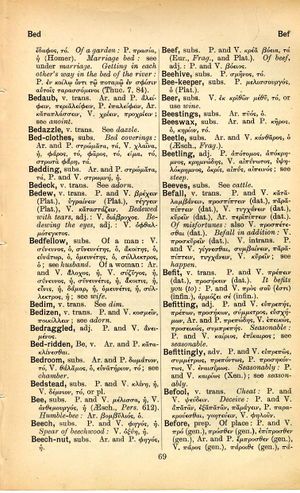bee: Difference between revisions
From LSJ
βωμὸν Ἀριστοτέλης ἱδρύσατο τόνδε Πλάτωνος, ἀνδρὸς ὃν οὐδ' αἰνεῖν τοῖσι κακοῖσι θέμις → Aristotle had this altar of Plato set up — Plato, a man whom the wicked dare not even mention in praise
(1) |
m (Text replacement - "(|thumb)\n(\|link=)" to "$1$2") |
||
| Line 1: | Line 1: | ||
{{Woodhouse1 | {{Woodhouse1 | ||
|Text=[[File:woodhouse_69.jpg|thumb | |Text=[[File:woodhouse_69.jpg|thumb|link={{filepath:woodhouse_69.jpg}}]]'''subs.''' | ||
|link={{filepath:woodhouse_69.jpg}}]]'''subs.''' | |||
P. and V. [[μέλισσα]], ἡ, V. [[ἀνθεμουργός]], ἡ (Aesch.. ''Pers.'' 612). | P. and V. [[μέλισσα]], ἡ, V. [[ἀνθεμουργός]], ἡ (Aesch.. ''Pers.'' 612). | ||
Revision as of 17:05, 18 May 2020
English > Greek (Woodhouse)
subs.
P. and V. μέλισσα, ἡ, V. ἀνθεμουργός, ἡ (Aesch.. Pers. 612).
Humble-bee: Ar. βομβυλιός, ὁ.
Latin > English (Lewis & Short)
bee:
I the sound made by a sheep, Varr. R. R. 2, 1, 7; cf. balo.
Latin > French (Gaffiot 2016)
bee, ind., onomatopée reproduisant le bêlement des moutons : Varro R. 2, 1, 7.
Latin > German (Georges)
bee, griech. βη, Naturlaut der Schafe, Varr. r. r. 2, 1, 7.
Latin > English
bee INTERJ :: baa; sound made by a sheep

